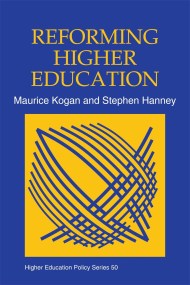Dimensions of Evaluation in Higher Education
On sale
1st July 1991
Price: £35
During the last twenty years, evaluation in higher education has become a critical issue for academics, administrators and politicians. This is due in large part to the great expansion of higher education systems, the increasing financial constraints in the public sector and the corresponding demand for accountability, and to the general tendency towards decentralization over the past two decades.
This book addresses primary issues in evaluation in an international, a national and a long term perspective. Roeland int’Veld sets the policy frameworks within which the increased emphasis on evaluation must be considered. Michael Shattock analyses the contribution of universities to society through an historical and contemporary account of their goals and functions. Andre‚ Staropoli assesses the evaluation of research, something which has grown to be a political priority. Urban Dahloff reflects on the universally low priority given to the evaluation of teaching and provides a critique of the measures that are being used. He also pursues the notion that evaluation of teaching is best carried out through an interactive process-centred approach. John Harris reports a study of ways of comparing higher education in the USA with that of competitor nations.
These essays come together to demonstrate that arguments about the nature and techniques of evaluation must entail far broader considerations than those often promoted by policy makers. The specific experiences and strengths of each author have been drawn upon and matched with the corresponding topics of the chapters in the book. This book is an important addition to the rapidly growing agenda of evaluation topics.
This book addresses primary issues in evaluation in an international, a national and a long term perspective. Roeland int’Veld sets the policy frameworks within which the increased emphasis on evaluation must be considered. Michael Shattock analyses the contribution of universities to society through an historical and contemporary account of their goals and functions. Andre‚ Staropoli assesses the evaluation of research, something which has grown to be a political priority. Urban Dahloff reflects on the universally low priority given to the evaluation of teaching and provides a critique of the measures that are being used. He also pursues the notion that evaluation of teaching is best carried out through an interactive process-centred approach. John Harris reports a study of ways of comparing higher education in the USA with that of competitor nations.
These essays come together to demonstrate that arguments about the nature and techniques of evaluation must entail far broader considerations than those often promoted by policy makers. The specific experiences and strengths of each author have been drawn upon and matched with the corresponding topics of the chapters in the book. This book is an important addition to the rapidly growing agenda of evaluation topics.
Newsletter Signup
By clicking ‘Sign Up,’ I acknowledge that I have read and agree to Hachette Book Group’s Privacy Policy and Terms of Use









